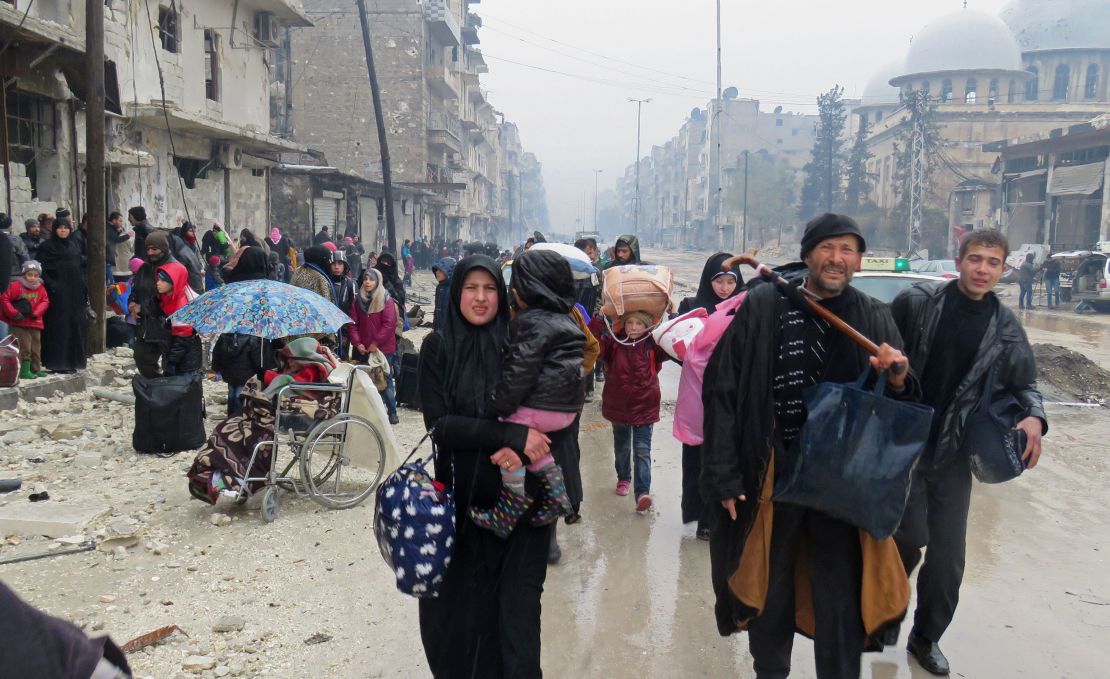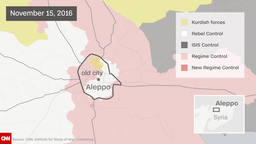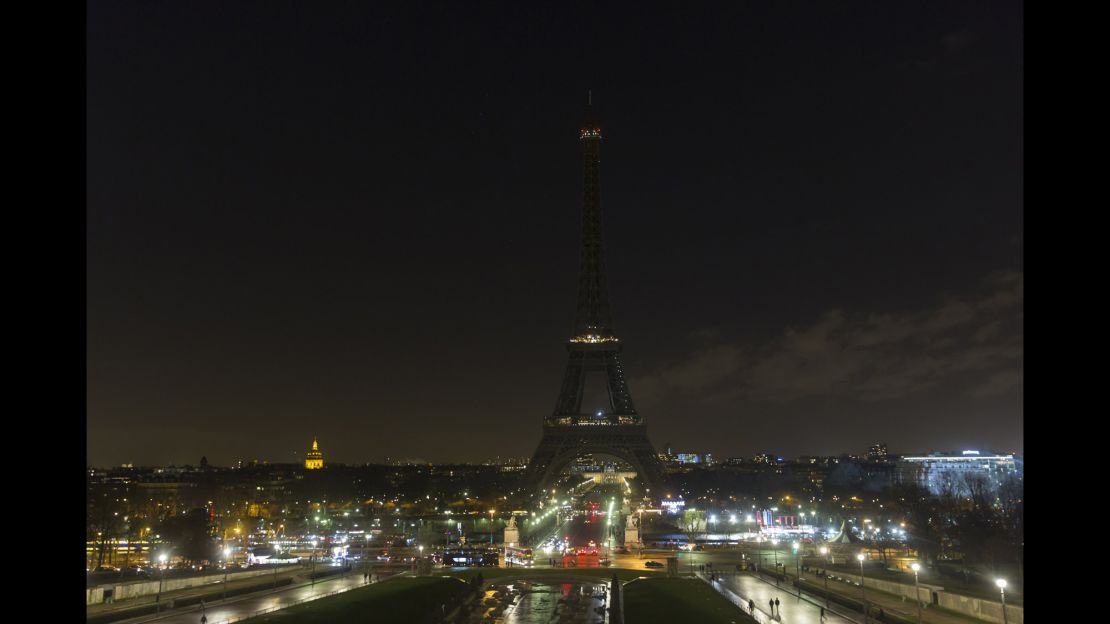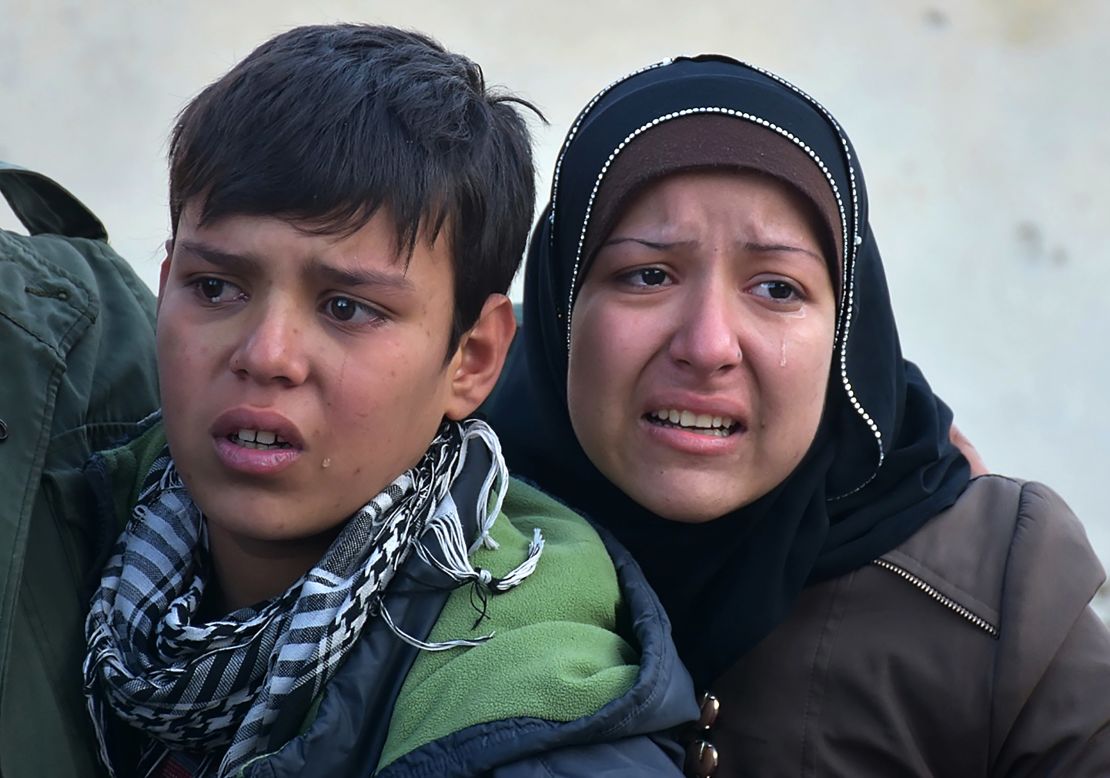Aleppo residents will be allowed to leave on Thursday under a new ceasefire agreement reached overnight, a rebel group said.
According to Ahmad Qurah Ali, spokesman for the Ahrar al-Sham rebel group, the deal was reached late Wednesday and will permit injured people to be evacuated beginning in the morning.
The original ceasefire brokered Tuesday collapsed less than a day after it began.
Deaths were reported on both sides Wednesday, while some 50,000 civilians are thought to remain inside the small pocket of eastern Aleppo still under rebel control.
The brief ceasefire, which Turkey and Russia helped broker, aimed to begin evacuating rebels and civilians from the city Wednesday morning, but that didn’t happen.
Turkey and activists on the ground accused the Syrian regime and other forces of heavy shelling and bombardment as world leaders demanded a new ceasefire deal.
Latest developments
- Diplomats from Turkey, Russia and Iran will meet December 27 in Moscow to discuss the situation in Aleppo
- UN human rights chief says resumed bombardment in Aleppo likely a war crime
- US ambassador to United Nations says to other members: “You have a responsibility to denounce these atrocities”
- Doctors in the city are “terrified and losing hope,” Doctors Without Borders says
- Turkish President Recep Tayyip Erdogan accuses Syrian regime of breaking ceasefire
- Planned evacuations of civilians at dawn Wednesday did not happen
- Iranian President Hassan Rouhani called Syrian President Bashar al-Assad to congratulate him, state media say
Ceasefire a ‘false hope’
Battle for Aleppo: Full coverage
UN High Commissioner for Human Rights Zeid Ra’ad Al Hussein said he was appalled by the ceasefire agreement’s swift collapse.
“While the reasons for the breakdown in the ceasefire are disputed, the resumption of extremely heavy bombardment by the Syrian government forces and their allies on an area packed with civilians is almost certainly a violation of international law and most likely constitutes war crimes,” he said in a statement Wednesday.
Speaking to CNN from Aleppo Wednesday night, ITV correspondent Dan Rivers described what he said was a “constant percussion of artillery tank-fire.”
“We’ve seen rockets streaking behind us,” he said.
Aref Al-Aref, a medic inside the zone, spoke to CNN over the phone Wednesday as the sounds of two explosions rang in the background.
“People were hopeful that they were leaving this hell. But it was a false hope,” he said.
“We are now worried about leaving the house. If the regime decides to launch an air raid, a massacre will take place right away. The area we are left in is too small.”

An Aleppo resident who spoke to CNN on condition of anonymity gave a harrowing account of the scene at a hospital in a rebel-controlled part of eastern Aleppo.
“I thought I walked into a slaughterhouse. There were dead bodies everywhere,” the resident said. “There were many, many, wounded people. The doctors are not able to cope with the load anymore. They ran out of plasma and other medical supplies.”
In rebel-held areas, food and supplies are running out, the resident said. “People are living on the very last remaining sacks of baking flour they have. They are using wood from furniture they take from the house to use for cooking. There is no more cooking gas.”
The Syrian regime is on the brink of taking the whole city of Aleppo, having made sweeping gains in just over two weeks since its forces, backed by airstrikes, entered the enclave by ground.

Rebel groups held eastern Aleppo for more than four years after the Arab Spring uprising, and a regime siege on the area had essentially cut it off from the outside world, sparking a humanitarian crisis there.
If the regime does take control of the key city, it would mark a turning point in the brutal five-year war that has killed hundreds of thousands of people.
‘Why are you silent?’
Turkish President Recep Tayyip Erdogan on Wednesday accused the regime of breaking the truce.
“Turkey will not leave the people of Aleppo alone,” he said, according to state-run news agency Anadolu.
“I call all parties and international society to respect the ceasefire, to support it. A humanitarian corridor should be open and innocent people should be able to leave with no obstacle and sabotage. People of Eastern Aleppo should leave safe and sound.”
Erdogan and Russian President Vladimir Putin spoke about the ceasefire agreement on Wednesday, underscoring that it should be applied, violations should be avoided and the promised evacuations should occur, Turkey’s official Anadolou news agency reported.
The top diplomats of Turkey, Russia and Iran are set to meet on December 27 in Moscow to discuss the situation in Aleppo, Turkey’s official news agency Anadolu reported Wednesday, citing Turkish Foreign Minister Mevlut Cavusoglu. No further details were reported regarding the meeting or the agenda.
But diplomatic efforts so far have seemed to have little impact on the streets of Aleppo, where the situation Wednesday appeared increasingly grim.
Aleppo Media Center activist Salah Ashkar told CNN earlier that shelling was ongoing in his neighborhood, and posted a video to Twitter showing walls in his building damaged and rubble all over the rooftop.
“A missile just fell on the roof of my building,” he said in the video. “Now the people who were waiting (for) the buses have to run back for their lives again (to) find shelter.”
Fatemah Alabed, the mother of a 7-year-old girl whose tweets from Aleppo have captured the world’s attention, said intense bombing was taking place, asking: “Why are you silent? Why?”
Alabed also tweeted directly to Turkish Foreign Minister Mevlut Cavusoglu, saying they had hope Tuesday, “but what’s happening now? Please help us now. No more time left.”
Cavusoglu responded, saying “Keep your hope my sister. Turkey hears your call.”
In Paris, the Eiffel Tower went dark Wednesday night as a gesture of solidarity with the people of Aleppo.

No evacuations Wednesday
As government forces were on the brink of taking all of Aleppo, a ceasefire originally was announced late Tuesday that was to see government troops, regime-aligned militia and rebel forces stand down on Wednesday.
The first group of evacuees scheduled to leave was supposed to consist of 70 injured people and family members – a total of 150 people. Buses waited to carry them out, but the ceasefire crumbled.
Aleppo: We are witnessing the cost of looking away

Syria: The children who put Aleppo’s suffering on the map
An International Committee of the Red Cross official in Aleppo told CNN the organization “is ready to help the parties to this agreement in overseeing the evacuation of civilians.”
He added that they are “on standby” in case a request is made to support in an evacuation.
World Vision has said it is ready in Syria and can help as many as 100,000 displaced people.
CNN’s Impact Your World team has ways viewers/readers can help Syrians. Please visit CNN.com/impact
CNN’s Euan McKirdy, Sonia Moghe, Waffa Munayyer, Richard Roth, Merieme Arif, Joel Williams, Fred Pleitgen, Alexander Felton, Kareem Khadder, Jomana Karadsheh, Eyad Kourdi, Basma Atassi, Hilary Clarke, Kara Fox, Eliza Mackintosh, Ghazi Balkiz and James Masters contributed to this report.























